牛津上海版六年级下Unit9 Sea water and rain water教案
牛津上海版英语六年级下册Unit9Seawaterandrainwater单元分析以及教学设计
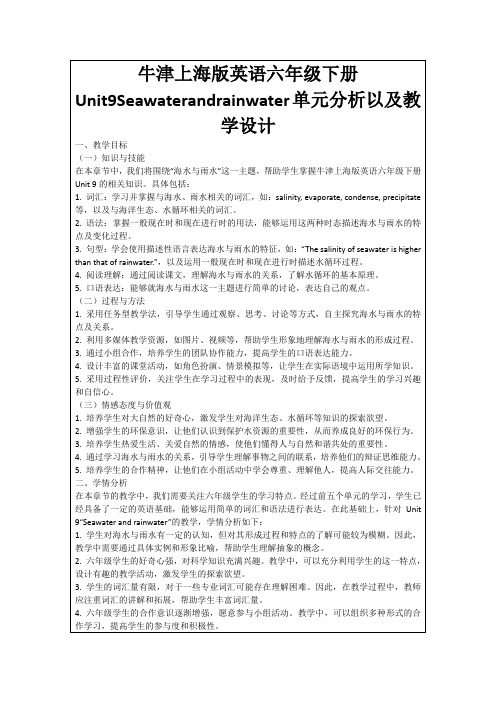
作业布置要求:
1.作业量适中,以确保学生能够在规定时间内完成。
2.鼓励学生自主完成作业,培养独立思考和学习能力。
3.家长协助监督,关注学生的学习进度,鼓励学生遇到问题主动请教。
4.教师在批改作业时,要关注学生的完成情况,及时给予反馈,提高学生的学习兴趣和自信心。
2.语法:掌握一般现在时和现在进行时的用法,能够运用这两种时态描述海水与雨水的特点及变化过程。
3.句型:学会使用描述性语言表达海水与雨水的特征,如:“The salinity of seawater is higher than that of rainwater.”,以及运用一般现在时和现在进行时描述水循环过程。
7.教学拓展:鼓励学生在课后进行科学探究,如观察雨水、了解海水淡化技术等,将所学知识应用于生活实际。
四、教学内容与过程
(一)导入新课
1.教学活动设计:通过提问方式引导学生回顾已学的关于水的知识,如“Do you know where water comes from?”、“Can you tell me about the water cycle?”,激发学生的思维,为新课的学习做好铺垫。
4.阅读理解:通过阅读课文,理解海水与雨水的关系,了解水循环的基本原理。
5.口语表达:能够就海水与雨水这一主题进行简单的讨论,表达自己的观点。
(二)过程与方法
1.采用任务型教学法,引导学生通过观察、思考、讨论等方式,自主探究海水与雨水的特点及关系。
2.利用多媒体教学资源,如图片、视频等,帮助学生形象地理解海水与雨水的形成过程。
3.通过小组合作,培养学生的团队协作能力,提高学生的口语表达能力。
牛津上海版英语六年级下册《Unit 9 Sea water and rain water》教学设计8
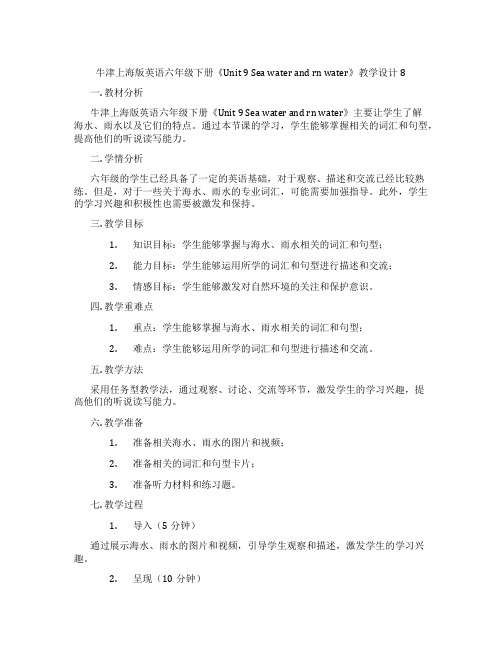
牛津上海版英语六年级下册《Unit 9 Sea water and rn water》教学设计8一. 教材分析牛津上海版英语六年级下册《Unit 9 Sea water and rn water》主要让学生了解海水、雨水以及它们的特点。
通过本节课的学习,学生能够掌握相关的词汇和句型,提高他们的听说读写能力。
二. 学情分析六年级的学生已经具备了一定的英语基础,对于观察、描述和交流已经比较熟练。
但是,对于一些关于海水、雨水的专业词汇,可能需要加强指导。
此外,学生的学习兴趣和积极性也需要被激发和保持。
三. 教学目标1.知识目标:学生能够掌握与海水、雨水相关的词汇和句型;2.能力目标:学生能够运用所学的词汇和句型进行描述和交流;3.情感目标:学生能够激发对自然环境的关注和保护意识。
四. 教学重难点1.重点:学生能够掌握与海水、雨水相关的词汇和句型;2.难点:学生能够运用所学的词汇和句型进行描述和交流。
五. 教学方法采用任务型教学法,通过观察、讨论、交流等环节,激发学生的学习兴趣,提高他们的听说读写能力。
六. 教学准备1.准备相关海水、雨水的图片和视频;2.准备相关的词汇和句型卡片;3.准备听力材料和练习题。
七. 教学过程1.导入(5分钟)通过展示海水、雨水的图片和视频,引导学生观察和描述,激发学生的学习兴趣。
2.呈现(10分钟)教师展示相关的词汇和句型卡片,引导学生学习和朗读。
同时,通过简单的日常对话,让学生初步运用所学的词汇和句型。
3.操练(10分钟)学生分角色扮演,模拟海水、雨水的场景,运用所学的词汇和句型进行描述和交流。
教师巡回指导,纠正发音和语法错误。
4.巩固(10分钟)学生听听力材料,回答相关问题。
教师讲解答案,并进行讲解和辅导。
5.拓展(10分钟)学生分组讨论,探讨海水、雨水对人类和环境的影响。
每组选代表进行汇报,其他组进行评价。
6.小结(5分钟)教师总结本节课的学习内容,强调重点词汇和句型。
2019-2020学年度牛津上海版英语六年级下册unit 9 Sea water and rain water巩固辅导第七十一篇
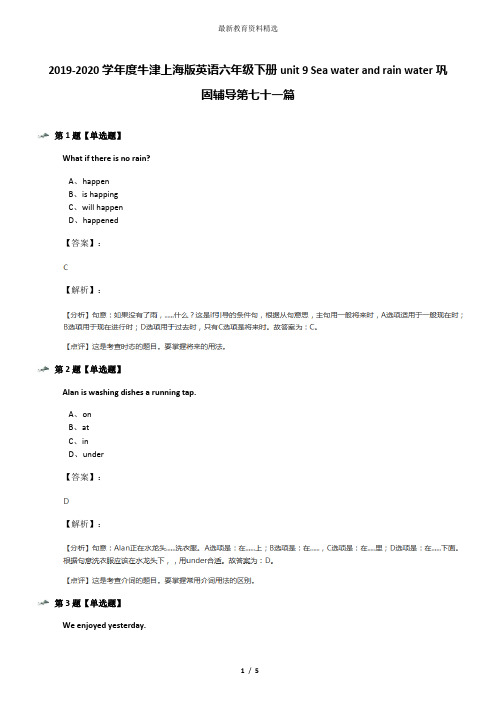
2019-2020学年度牛津上海版英语六年级下册unit 9 Sea water and rain water巩固辅导第七十一篇第1题【单选题】What if there is no rain?A、happenB、is happingC、will happenD、happened【答案】:【解析】:第2题【单选题】Alan is washing dishes a running tap.A、onB、atC、inD、under【答案】:【解析】:第3题【单选题】We enjoyed yesterday.A、ourB、usC、oursD、ourselves【答案】:【解析】:第4题【单选题】What about tennis with me this afternoon?A、playB、to playC、playsD、playing【答案】:【解析】:第5题【单选题】There a class competition about the oceans.A、is going to haveB、will haveC、will beD、will is【答案】:【解析】:第6题【单选题】The sharks are one of the in the sea.A、more dangerous animalB、most dangerous animalsC、more dangerous animalsD、most dangerous animal【答案】:【解析】:第7题【单选题】Oceans are important all animals.A、onB、fromC、ofD、to【答案】:【解析】:第8题【单选题】When the teacher came in, the students stopped ; when he came out, the students stopped .A、to talk, to talkB、talking, talkingC、to talk, talkingD、talking, to talk【答案】:【解析】:第9题【句型转换】John can hardly understand Russian. (改为反意疑问句)John can hardly understand Russian, ____________?【答案】:【解析】:第10题【句型转换】Mr. Smith stayed at home last night. He didn"t go shopping. (保持句意基本不变) Mr. Smith stayed at home____________going shopping last night.【答案】:【解析】:第11题【单词拼写(词汇运用)】I have a s______everyday in summer.【答案】:【解析】:第12题【语法填空】It is______toride a motorcycle fast at night. (danger) 【答案】:【解析】:。
牛津上海版英语(一起)六年级下册Unit 9《Sea water and rain water》ppt课件3
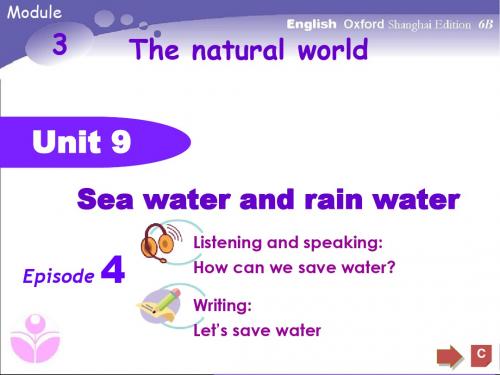
wash vegetables under a running tap
12
C
Make sentences
PIGGY BANK
“by doing”, “by not doing”.
GOLD MINE
2-1
turn off a dripping tap
play water games
Module
3
The natural world
Unit 9
Sea water and rain water
4 Episode
Listening and speaking: How can we save water?
Writing:
Let’s save water
C
PIGGY BANK
GOLD MINE
1234
C
Match Game
PIGGY BANK
GOLD MINE
a dripping tap a running tap a shower
C
Match Game
PIGGY BANK
GOLD MINE
vegetables a bath
brush teeth
C
PIGGY BANK
GOLD MINE
12345
PIGGY BANK
GOLD MINE
5-1
C
A quiz about water
3 Which suggestion can
save water? a Turn off a dripping
tap. b Brush teeth under a
running tap. c Take a bath.
牛津上海版(一起)六年级下Unit 9《Sea water and rain water》ppt课件1

1
2
3
Wash vegetables ____________ Turn off a _________ dripping tap dripping tap under a __________ running tap. __________________. Fix a______________.
A quiz about saving water
3 Which can save water? a Turn off a dripping tap. b Brush teeth under a running tap. c Take a bath. 4
by hands , not by washing machines
Save or waste?
• You will hear some sentences next. Listen carefully and write down the missing words. Make a tick if it will save water and make a cross if it will waste water.
A: How can we save water? B: We can save water by (not) doing…
turn off a dripping tap play water games
brush your teeth under a running tap take a shower instead of a bath
e less water. 2.Don’t pollute water. 3.Don’t waste water.
六年级下册英语 Unit 9 Sea water andrain water 牛津上海版
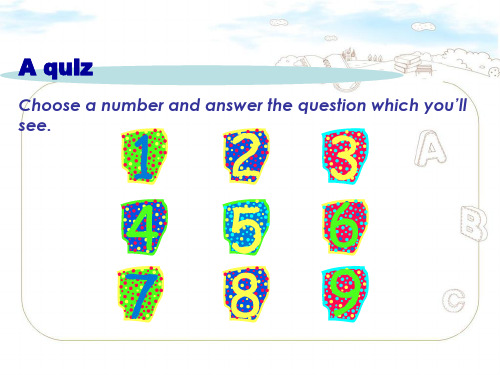
流,湖泊,大海和海洋里。
• The oceans-2
• Whales,dolphins and sharks are sea animals.
• Whales are the largest animals on the Earth.
Make sentences
“by doing”, “by not doing”.
turn off a dripping tap
play water games
take a shower instead of brush your teeth under
a bath
a running tap
Write and listen
A quiz
Choose a number and answer the question which you’ll see.
What covers almost a quarter of the Earth?
Land.
What covers almost three quarters of the Earth?
intelligent animals
Dolphins are one of the most intelligent animals.
word box
• quarter
四分之一
• quarter half three quarter(四分之三)
• intelligent 聪明的
• intelligent animals
14.a dripping tap滴水龙头 15.a running tap冲水龙头
【牛津上海版】六年级英语下册课件:Unit 9 Sea water andrain water 教学课件

GOLD MINE
8-8
1. Fix a dripping tap. 2. Don’t wash vegetables under a running tap. 3. We should turn off a dripping tap. 4. We shouldn’t play water games. 5. We can save water by taking a shower instead
a dripping tap b running tap c shower
12345
C
A quiz about water
2 You can save water by
not_____. a turning off a dripping
tap. b washing fruit under a
running tap. c taking a shower.
GOLD MINE
5-1
C
A quiz about water
5
Taking a bath instead of a shower can _____.
a save water b waste water c pollute water
12345
PIGGY BANK
GOLD MINE
5-1
C
PIGGY BANK
12345
PIGGY BANK
GOLD MINE
5-1
C
A quiz about water
4 Which suggestion
can’t save water? a Fix a dripping tap. b Play water games. c Take a shower
牛津上海版英语六年级下册Unit9Seawaterandrainwater单元分析以及优秀教学案例

四、教学内容与过程
(一)导入新课
1.利用多媒体展示海水和雨水的图片,引导学生关注和思考海水、雨水的特点和它们之间的联系。
2.提出问题:“你们对海水、雨水有什么了解?它们有什么不同之处?”引起学生的好奇心和思考。
3.介绍本节课的学习目标和内容,让学生明确学习的要求和方向。
(二)问题导向
1.设计有针对性的问题,引导学生思考和探究海水、雨水的特点和它们之间的联系。
2.通过问题链的方式,逐步引导学生深入思考,激发学生的思维能力和解决问题的能力。
3.鼓励学生提出问题,培养学生的批判性思维和独立思考能力。
(三)小组合作
1.设计小组讨论和合作任务,让学生在小组内进行交流和合作,共同完成任务。
牛津上海版英语六年级下册Unit9Seawaterandrainwater单元分析以及优秀教学案例
一、案例背景
牛津上海版英语六年级下册Unit9 "Seawater and rainwater"单元,主要让学生了解海水、雨水的特点以及它们之间的联系。本单元涉及词汇和语法结构的学习,如比较级和最高级形式,以及一般现在时的被动语态。
二、教学目标
(一)知识与技能
1.学生能够掌握与海水、雨水相关的词汇,如seawater, rainwater, salty, fresh, evaporate, condense等。
2.学生能够运用所学词汇描述海水、雨水的特点和它们之间的联系。
3.学生能够正确运用一般现在时的被动语态表达相关语法结构,如"Seawater is evaporated by the sun."和"Rainwater is condensed and falls back to the earth."。
六年级下册英语课件- Unit 9 Sea water andrain water |牛津上海版 (

running tap. c Take a bath.
4
Which can’t save water?
a Fix a dripping tap. b Play water games. c Take a shower
A quiz about saving water
5
6
✓
Take a __s_h_o_w__e_r__ Brush your _t_e_e_t_h__ instead of a _b__a_t_h_. under a _r_u_n_n_in__g_t_a_.p
Three DOs
1. Fix a dripping tap. 2. Turn off a dripping tap. 3. Take a shower instead of a bath.
by doing…
by not doing…
fix a dripping tap
turn off a dripping tap
brush your teeth under a running tap
We can save water by fixing a dripping tap. We can save water by turning off a dripping tap.
brush your teeth under a running tap
play water games
take a shower instead of a bath
A: How … ? B: … by (not) doing…
turn off a dripping tap
play water games
牛津版上海版六年级下册Unit9Seawaterandrainwater

Unit 9 Sea water and rain water一、单元分析(Unit Analysis)(一)单元地位(Unit Position)16B 中已显现了use water to do sth.,本单元介绍了此句型的另为一种表达方式:use water for doing sth.,教师能够从use…to do.. 引出use … for doing用法。
教师让学生用身旁的例子和生活体会,导入此句型。
,鼓舞用此句型进行操练。
2本单元显现了if…will…的复合句,要增强操练。
学生对复合句的用法不很熟练,应设计各类情景,强化此句型的操练,以达到熟练运用。
3新的句型:we can save water by doing sth.学生在同意时会碰到困难,应该多加以机械操练。
4祈使句已经在前两册中显现过,本单元继续增强。
Fixing dripping taps. Turn dripping taps off.5Have you ever seen…? 的句型在6A中已显现,但作为知识难点,教师在学习进程中还要再复现与强调。
6作为情感态度进展的目标,教师要对学生进行节约能源的教育。
(二)单元目标(Unit Target)1熟练把握use sth. for doing sth. / We use water for showering. / We use water for cooking.2If… will…复合句的把握,结合阅读的材料进行操练。
3把握句型:How can we use water?We can use water by doing sth.4介词for 的用法(后跟一段时刻); 介词by, under的用法5重点把握情态动词can表达建议的用法。
(三)单元重点(Unit Points)1 关键词:⑴关于海洋生物的介绍:a coral reef, seaweed, dolphin, shark, intelligent.⑵关于如何节约用水:fix a dripping tap, turn a runni ng tap off, take a shower2 功能:用what/why/where/when/who/how…?询问对方,获取信息。
六年级下册英语课件- Unit 9 Sea water andrain water |牛津上海版 (共26张PPT)

1
2
3
✓
✓
Fix
a__d_r_i_p_p_i_n_g__t_a_p_.
Wash v_e_g__e_t_a_b_le__s__ under a _r_u_n_n_in_g__t_a_p.
T_u__rn__do_rf_ifp_ap_i__n__g____t__a__p______.
4
Play __w__a_t_e_r______ games.
by doing…
by not doing…
fix a dripping tap
turn off a dripping tap
brush your teeth under a running tap
We can save water by fixing a dripping tap. We can save water by turning off a dripping tap.
tap. b Brush teeth under a
running tap. c Take a bath.
4
Which can’t save water?
a Fix a dripping tap. b Play water games. c Take a shower
A quiz about saving water
Ways of saving water
1. We can save water by _t_a_k_in__g_(take) shorter showers. 2. We can save water by _n_o_t__le_a_v_i_n_g_(not leave) the tap
running when we don’t need to use water. 3. We can save water by__u__s_in__g_ (use) a glass when we are brushing teeth. 4. We can save water by __n_o_t_p_o__ll_u_t_in_g__(not pollute)
牛津上海版英语六年级下册《Unit 9 Sea water and rain water》教学设计3
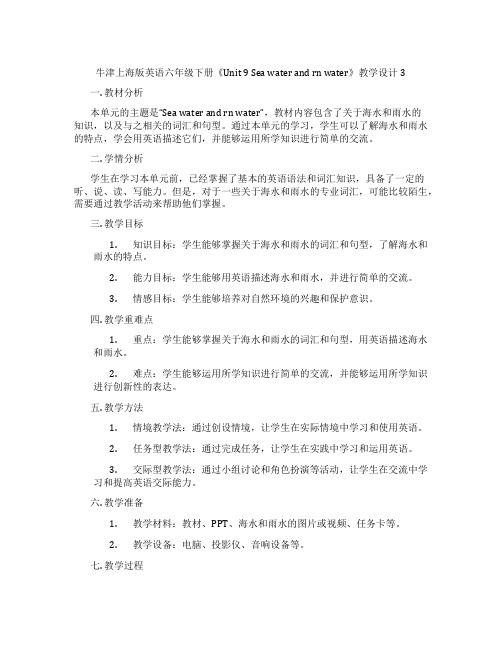
牛津上海版英语六年级下册《Unit 9 Sea water and rn water》教学设计3一. 教材分析本单元的主题是“Sea water and rn water”,教材内容包含了关于海水和雨水的知识,以及与之相关的词汇和句型。
通过本单元的学习,学生可以了解海水和雨水的特点,学会用英语描述它们,并能够运用所学知识进行简单的交流。
二. 学情分析学生在学习本单元前,已经掌握了基本的英语语法和词汇知识,具备了一定的听、说、读、写能力。
但是,对于一些关于海水和雨水的专业词汇,可能比较陌生,需要通过教学活动来帮助他们掌握。
三. 教学目标1.知识目标:学生能够掌握关于海水和雨水的词汇和句型,了解海水和雨水的特点。
2.能力目标:学生能够用英语描述海水和雨水,并进行简单的交流。
3.情感目标:学生能够培养对自然环境的兴趣和保护意识。
四. 教学重难点1.重点:学生能够掌握关于海水和雨水的词汇和句型,用英语描述海水和雨水。
2.难点:学生能够运用所学知识进行简单的交流,并能够运用所学知识进行创新性的表达。
五. 教学方法1.情境教学法:通过创设情境,让学生在实际情境中学习和使用英语。
2.任务型教学法:通过完成任务,让学生在实践中学习和运用英语。
3.交际型教学法:通过小组讨论和角色扮演等活动,让学生在交流中学习和提高英语交际能力。
六. 教学准备1.教学材料:教材、PPT、海水和雨水的图片或视频、任务卡等。
2.教学设备:电脑、投影仪、音响设备等。
七. 教学过程1.导入(5分钟)通过播放海水和雨水的图片或视频,引导学生关注本单元的主题。
教师可以用一些简单的问题来引入话题,如:“Do you like sea water? Why?” “Have you ever drunk rn water? How does it taste?” 等。
2.呈现(10分钟)教师通过PPT展示本单元的词汇和句型,并用英语解释它们的意思。
2018牛津上海版(一起)六下Unit 9《Sea water and rain water》教案

Unit 9 Sea water and rain water一、单元分析(Unit Analysis)(一)单元地位(Unit Position)16B 中已出现了use water to do sth.,本单元介绍了此句型的另为一种表达方式:use water for doing sth., 教师可以从use…to do.. 引出use … for doing用法。
教师让学生用身边的例子和生活经验,导入此句型。
,鼓励用此句型进行操练。
2本单元出现了if… will…的复合句,要加强操练。
学生对复合句的用法不很熟练,应设计各种情景,强化此句型的操练,以达到熟练运用。
3新的句型:we can save water by doing sth.学生在接受时会遇到困难,应该多加以机械操练。
4祈使句已经在前两册中出现过,本单元继续加强。
Fixing dripping taps. Turn dripping taps off.5Have you ever seen…? 的句型在6A中已出现,但作为知识难点,教师在学习过程中还要再复现与强调。
6作为情感态度发展的目标,教师要对学生进行节约能源的教育。
(二)单元目标(Unit Target)1熟练掌握use sth. for doing sth. / We use water for showering. / We use water for cooking. 2If… will…复合句的掌握,结合阅读的材料进行操练。
3掌握句型:How can we use water?We can use water by doing sth.4介词for 的用法(后跟一段时间); 介词by, under的用法5重点掌握情态动词can表达建议的用法。
(三)单元重点(Unit Points)1 关键词:⑴关于海洋生物的介绍:a coral reef, seaweed, dolphin, shark, intelligent.⑵关于如何节约用水:fix a dripping tap, turn a runni ng tap off, take a shower2 功能:用what/why/where/when/who/how…?询问对方,获取信息。
牛津上海版英语六年级下册《Unit 9 Sea water and rain water》说课稿3
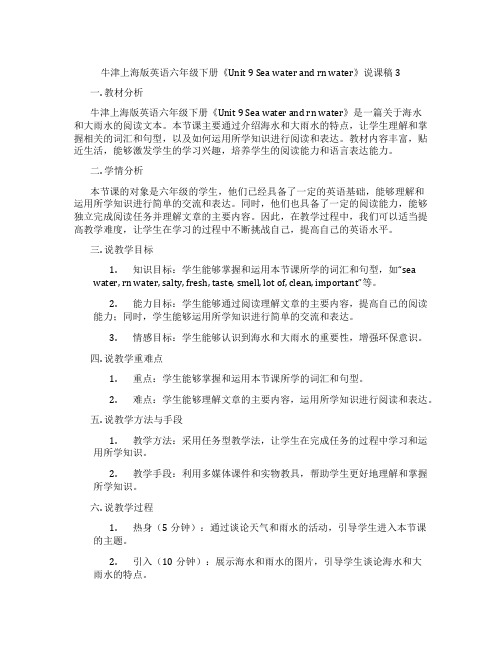
牛津上海版英语六年级下册《Unit 9 Sea water and rn water》说课稿3一. 教材分析牛津上海版英语六年级下册《Unit 9 Sea water and rn water》是一篇关于海水和大雨水的阅读文本。
本节课主要通过介绍海水和大雨水的特点,让学生理解和掌握相关的词汇和句型,以及如何运用所学知识进行阅读和表达。
教材内容丰富,贴近生活,能够激发学生的学习兴趣,培养学生的阅读能力和语言表达能力。
二. 学情分析本节课的对象是六年级的学生,他们已经具备了一定的英语基础,能够理解和运用所学知识进行简单的交流和表达。
同时,他们也具备了一定的阅读能力,能够独立完成阅读任务并理解文章的主要内容。
因此,在教学过程中,我们可以适当提高教学难度,让学生在学习的过程中不断挑战自己,提高自己的英语水平。
三. 说教学目标1.知识目标:学生能够掌握和运用本节课所学的词汇和句型,如“seawater, rn water, salty, fresh, taste, smell, lot of, clean, important”等。
2.能力目标:学生能够通过阅读理解文章的主要内容,提高自己的阅读能力;同时,学生能够运用所学知识进行简单的交流和表达。
3.情感目标:学生能够认识到海水和大雨水的重要性,增强环保意识。
四. 说教学重难点1.重点:学生能够掌握和运用本节课所学的词汇和句型。
2.难点:学生能够理解文章的主要内容,运用所学知识进行阅读和表达。
五. 说教学方法与手段1.教学方法:采用任务型教学法,让学生在完成任务的过程中学习和运用所学知识。
2.教学手段:利用多媒体课件和实物教具,帮助学生更好地理解和掌握所学知识。
六. 说教学过程1.热身(5分钟):通过谈论天气和雨水的活动,引导学生进入本节课的主题。
2.引入(10分钟):展示海水和雨水的图片,引导学生谈论海水和大雨水的特点。
3.阅读理解(15分钟):学生独立阅读文章,回答相关问题,理解文章的主要内容。
牛津版上海版六年级下册 Unit 9 Sea water andrain water 教学设计
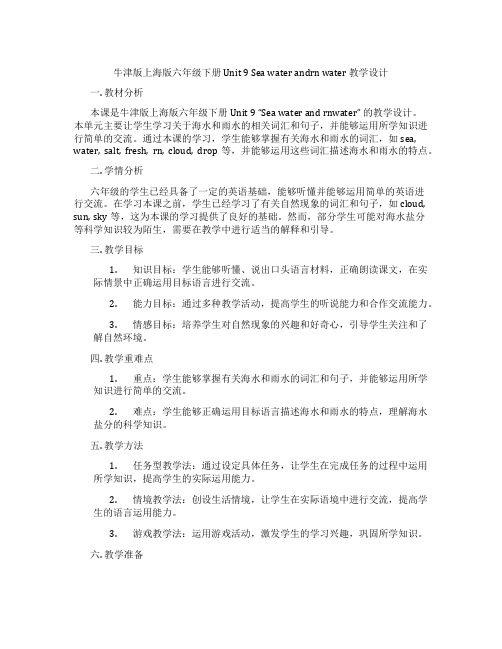
牛津版上海版六年级下册 Unit 9 Sea water andrn water 教学设计一. 教材分析本课是牛津版上海版六年级下册Unit 9 “Sea water and rnwater” 的教学设计。
本单元主要让学生学习关于海水和雨水的相关词汇和句子,并能够运用所学知识进行简单的交流。
通过本课的学习,学生能够掌握有关海水和雨水的词汇,如sea, water, salt, fresh, rn, cloud, drop等,并能够运用这些词汇描述海水和雨水的特点。
二. 学情分析六年级的学生已经具备了一定的英语基础,能够听懂并能够运用简单的英语进行交流。
在学习本课之前,学生已经学习了有关自然现象的词汇和句子,如cloud, sun, sky等,这为本课的学习提供了良好的基础。
然而,部分学生可能对海水盐分等科学知识较为陌生,需要在教学中进行适当的解释和引导。
三. 教学目标1.知识目标:学生能够听懂、说出口头语言材料,正确朗读课文,在实际情景中正确运用目标语言进行交流。
2.能力目标:通过多种教学活动,提高学生的听说能力和合作交流能力。
3.情感目标:培养学生对自然现象的兴趣和好奇心,引导学生关注和了解自然环境。
四. 教学重难点1.重点:学生能够掌握有关海水和雨水的词汇和句子,并能够运用所学知识进行简单的交流。
2.难点:学生能够正确运用目标语言描述海水和雨水的特点,理解海水盐分的科学知识。
五. 教学方法1.任务型教学法:通过设定具体任务,让学生在完成任务的过程中运用所学知识,提高学生的实际运用能力。
2.情境教学法:创设生活情境,让学生在实际语境中进行交流,提高学生的语言运用能力。
3.游戏教学法:运用游戏活动,激发学生的学习兴趣,巩固所学知识。
六. 教学准备1.教学课件:制作与海水和雨水相关的课件,展示图片、动画等素材,生动形象地展示教学内容。
2.教学卡片:准备有关海水和雨水的词汇卡片,方便学生学习和记忆。
牛津上海版(五四制) 六年级下册英语课件Unit 9Sea water and rain water (共28张PPT)
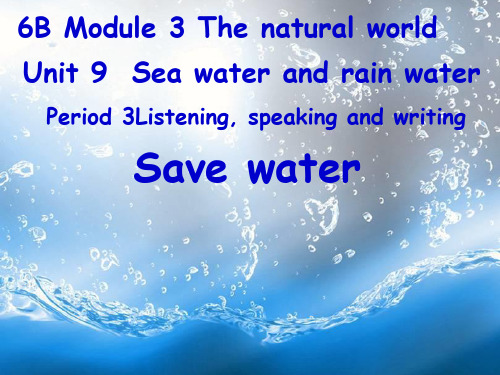
A: How … ? B: … by (not) doing…
turn off a dripping tap
play water games
fix a dripping tap
take a shower
brush your teeth under a running tap
instead of a bath
6B Module 3 The natural world Unit 9 Sea water and rain water
Period 3Listening, speaking and writing
Save water
cook
wash
What do they need to do these things?
swim. drink. cook food. wash clothes. water plants. have a bath/shower. …
water shortage 短缺,缺乏
Save water!
water pollution 污染
Save water!
How can we save water?
4
5
6Leabharlann water Play _____________ games.
shower teeth Take a __________ Brush your _______ bath under a __________. running tap instead of a ______.
Three DOs 1. Fix a dripping tap. 2. Turn off a dripping tap. 3. Take a shower instead of a bath. Three DON’Ts
牛津上海版英语六年级下册Unit9 Sea water and rain water知识点汇总

U9 Sea water and rain water知识点汇总一、重点单词二、重点短语三、重点句型1.几乎地球的四分之三是水。
2.许多鱼类和海洋动物生活在地球上的小溪、河流、湖泊、海洋。
3.鲸鱼是地球上最大的动物。
4.海豚是最聪明的动物之一。
5.渔民在深海用网捕鱼和捕虾。
6.我们必须停止砍伐森林。
7.如果没有雨,我们将没有水喝。
8.农民需要水来浇灌他们农场的庄稼和蔬菜。
9.我们可以通过修理漏水的水龙头来节约用水。
6.drip (n,)水滴(v.)滴下____________ (adj)滴水的巩固提升I. Filling in the blanks.(写出下列中英文)1.Making money is hard work. Don’t _____________ it. /ˈweɪstə/2.Happy farmland is a game which players can grow _____________. /krɒps/3.I’d like to find some information about water on the _____________. /'intənet/4.Knowing something about sea animals is very ___________. /ɪmˈpɔ:tnt/5.Danny is an _____________ boy in our class. /ɪnˈtelɪdʒənt/6.There is a beautiful_____________ between two mountains. /stri:m/7.About three quarters of the Earth is _____________ with water. /ˈkʌvəd/8.The _____________ show in Shanghai Wild Animal Park is very popular. /ˈdɒlfɪn/9.Our school canteen ________ lunch for us.[prəˈvaɪdz]10.Many ________ make their homes in the ________ of the trees. ['ɪnsekts] ['hɒləʊz]11.As we all know, a ________ is a large ________ of trees. [ˈfɒrɪst] [ˈeəriə]12.Some foreign visitors are learning to use__________. /'tʃɔpstiks/13.We need some new__________for our new flat. /'fə:nitʃə(r)/14.I like the clothes which are made of__________. /'kɔtn/15.The__________chair from IKEA is very fashionable. /'wudn/II.Choose the best answer(选择最恰当的答案)1.We can save water by not washing vegetables _________a running tap.A. atB. onC. inD. under2.You must fix the ________ tap.A.dripB. drippedC. drippingD. drips3.Whales are _________ animals on the Earth..A. the largeB. largestC. the largestD. the most large4.There is only ___________ drinking water in the world.A.littleB. a littleC. fewD. a few5.Can we get food _________the oceans?A. toB. fromC. forD. away6._________ can we do to save the world?A. WhatB. WhereC.WhichD. Who7.If I _________ time, I __________ to see you.A.have; goB. have; will goC. will have; goD. will have; will go8.Please turn _________ the TV. Tommy is doing homework.A. onB. offC. ofD. to9.We should not waste water in our daily life. How to pronounce the underlined part?A./ eɪ /B. / ɪ /C. / aɪ /D./ e /10.Firemen need water _________out fires.A. to putB. for putC. putD. putting11.Which sea animals do you like ___________, starfish or sea horses?A. betterB. bestC. manyD. most12.__________ important information it is!A.What B. What an C. How D. How an13.Here is a quiz __________ a school competition about water.A. withB. forC. toD. on14.What _________ important part water plays in our daily life!A. aB. anC. theD. /15.There _________ a new supermarket near our housing estate in a year.A. hasB. haveC. will haveD. will be16.We’ve got a lot of information about the topic. __________ very useful.A. They areB. It isC. They doD. It does17.Mary was ill, so Peter went to have a meeting ___________ herA.beforeB. instead ofC. in front ofD. because18.We can save money __________ snack.A.not to buyB. not buyingC. by not buyingD. not by buying19.__________ English is important ___________ everyone of us.A.Learning; toB. Learning; forC. Learn; toD. Learn; for20. A quarter of these apples __________ too much for me. But three quarters of the water________ not too much.A.is; isB. are; isC. is; areD. are; areIII.Fill in the blanks with the words in their proper forms (用所给词的适当形式填空)1.There are some _____________working in their farms. (farm)2.I’m too hot. I want to take a _____________(show).3.It is _______________ to learn English well. (importance)4.Dolphins are _______________ sea animals. (intelligence)5.The books are quite________________(interest).6.Eddie won a first prize in the reading ____________. (compete)7.My father is a ____________. He likes fishing very much. (fish)8.Shanghai is one of the ___________ cities in the world.(big)Ⅳ. Rewrite the following sentences as required(根据所给要求改写下列句子)1.We can go to a movie or the Ocean Park this Saturday. (改为否定句)We _________ __________ to a movie or the Ocean Park this Saturday.2.We should save water in our daily life.(改为一般疑问句)_________ we _________ water in our daily life?3.We can keep the room warm if we close the door. (保持句意不变)We can keep the room warm _________ __________ the door.4.Farmers can use water to water vegetables and crops. (对画线部分提问)What can farmers use water _________ __________ ?5.People can save paper by reusing it. (划线部分提问)_________ __________ people save paper ?6.We can take a shower to save water. We don’t have a bath. (合为一句)We can take a shower _________ __________ having a bath to save water.7.What other things can you see in the park?(同义句转换)_________ __________ can you see in the park?V. Reading Comprehension (阅读理解)A.Choose the words or expressions and complete the passage(选择最恰当的单词或词语完成短文)It was a Saturday afternoon. Mr Green was reading a newspaper. Suddenly he heard his wife 1 in the next room. He hurried to her and asked, "What happened to you, my dear?""Oh, dear!" his wife called out. "My head hurts! 2 a doctor. Hurry up!"Their twochildren were both out at that moment and something was wrong with the telephone. Mr. Green had to go to a hospital himself . Bad luck! That day all the hospitals in the town were 3 . Mr. Green didn't know where to go. Just then a friend of his saw him and asked, "What is the matter?"Mr. Green told everything. The man said, "Why not turn to 4 ? He can help you. "Mr. Green remembered his friend Mr. Black was a good doctor. He hurried to Mr. Black’s. When he got there, Mr. and Mrs. Black were having their 5 meal. The doctor asked Mr. Green to drink with him. He was happy and sat 6 . After that they began to chat. And when Mrs. Black asked," How is your wife?" "She is fine, thanks..."Mr. Green stopped at once---he remembered his wife was waiting for a doctor at home.1. A. crying B. laughing C. whispering D. singing2. A. Look for B. Wait for C. Send for D. Ask for3. A. expensive B. open C. free D. closed4. A. Mr. Brown B. Mr. Black C. Mr. Green D. Mrs. Green5. A. lunch B. supper C. morning D. evening6. A. in bed B. on floor C. at the table D. at homeB. Read the passage and fill in the blanks with suitable words(在短文的空格内填入适当的词,使其内容通顺。
- 1、下载文档前请自行甄别文档内容的完整性,平台不提供额外的编辑、内容补充、找答案等附加服务。
- 2、"仅部分预览"的文档,不可在线预览部分如存在完整性等问题,可反馈申请退款(可完整预览的文档不适用该条件!)。
- 3、如文档侵犯您的权益,请联系客服反馈,我们会尽快为您处理(人工客服工作时间:9:00-18:30)。
Unit 9 Sea water and rain water一、单元分析(Unit Analysis)(一)单元地位(Unit Position)16B 中已出现了use water to do sth.,本单元介绍了此句型的另为一种表达方式:use water for doing sth., 教师可以从use…to do.. 引出use … for doing用法。
教师让学生用身边的例子和生活经验,导入此句型。
,鼓励用此句型进行操练。
2本单元出现了if… will…的复合句,要加强操练。
学生对复合句的用法不很熟练,应设计各种情景,强化此句型的操练,以达到熟练运用。
3新的句型:we can save water by doing sth.学生在接受时会遇到困难,应该多加以机械操练。
4祈使句已经在前两册中出现过,本单元继续加强。
Fixing dripping taps. Turn dripping taps off.5Have you ever seen…? 的句型在6A中已出现,但作为知识难点,教师在学习过程中还要再复现与强调。
6作为情感态度发展的目标,教师要对学生进行节约能源的教育。
(二)单元目标(Unit Target)1熟练掌握use sth. for doing sth. / We use water for showering. / We use water for cooking. 2If… will…复合句的掌握,结合阅读的材料进行操练。
3掌握句型:How can we use water?We can use water by doing sth.4介词for 的用法(后跟一段时间); 介词by, under的用法5重点掌握情态动词can表达建议的用法。
(三)单元重点(Unit Points)1 关键词:⑴关于海洋生物的介绍:a coral reef, seaweed, dolphin, shark, intelligent.⑵关于如何节约用水:fix a dripping tap, turn a runni ng tap off, take a shower2 功能:用what/why/where/when/who/how…?询问对方,获取信息。
3 语法点:⑴ if 引导的状语从句主句的谓语动词是一般将来时态,从句的谓语动词是一般现在时态。
⑵ use for doing sth. We can save water by doing sth. for,by 介词后跟动名词。
二、教学设计(Teaching Designs)教学内容教学实施建议教学资源参考1Read (page 62-63) 这两页主要是介绍海洋的知识,教师可以先搜集一些关于海洋生物的图片,也可以让学生上网收集图片和照片。
本课没有新的语言点,教材上安排了教学活动,主要《活页资料》47页;结合课堂上的竞赛来用。
是引起学生的兴趣,如班级里海洋知识的竞赛,教师也可以多收集一些类似的题目。
另外要注意阅读技巧的培养。
详细见链接12关于64-65页的处理这部分讲水的用途,在6A中已经讲解过此部分的内容,在本单元中用了新的句型讲水的用途,教师可以以旧带新,可以先就水的重要性展开话题,然后阅读课文,操练句型:if…will…,最后做ClassProject: The use of water. 应用句型:weuse water for doing sth.详细内容见链接2教材上的阅读和project都是很好的素材。
3关于66,67两页内容的教学这两页都是讲节约用水的内容,建议放在一起教授。
P66 页的上讲述不要浪费水,并介绍了新单词。
P67页上讨论如何节约用水,有对话和写报告两部分内容,从口头和笔头上巩固所学新内容。
详细处理意见间链接3,4提供了搜集的关于节约用水的情况[链接1]说明:任务型教学活动多,学生有了更多的学习的自主空间,教师如何收放自如是关键,另外还要对学困生进行指导。
竞赛是学生喜欢的学习方式,每班的竞赛方式可以根据教师平时教学组织的习惯来安排本节课的竞赛内容。
1从杂志,网络上收集海洋生物的照片。
问学生海洋生物的名字,可以用brain-storm 的形式。
并用适当方式巩固海洋生物名称。
2 播放录音,让学生阅读文章。
也可以在巩固海洋生物的基础上把p48-p49的阅读语篇作为听力练习,让学生对文章内容先有个整体理解。
3 教师就文章内容设计提出一些问题,或是复述课文等活动,巩固复习阅读内容。
Where do we find water? What can we find in the ocean? How can we get drinkingwater from sea water?4 小组竞赛,可以提高学生学习英语的兴趣,问题见:P49。
也可以收集其他多个问题与材料,进行全班检测与反馈。
[链接2]说明:把学生学习英语的成果用小报或是别的形式予以展示,可以很好的调动学生学习英语的兴趣,使他们学习英语有了成就感。
班级里要留出一定的空间把小组的Class Project 展示出来。
1 教师可由关于水的重要性的问题引入:Where does water come from? Why do animalsand plants need water? How long can we live without water?2请学生谈谈若是缺水或是没水的情况下会发生什么。
3播放录音,阅读文章。
向学生介绍句型: If there is no rain, what will happen? 学生回答:If there is no rain, there will be no water to drink. If表示可能性和条件。
4学生分成小组讨论如果没有水的情况,用句型:if…will…讨论结束后,小组派代表讲述小组的讨论结果。
5继续讨论水的用途,介绍新句型:we use water for doing sth. 学生回答:we use water for brushing our teeth. We use water for showering. 并操练此句型的用法。
6小组活动。
完成P65页上的表格;然后小组讨论关于水的用途的更多的信息,可分成:at home, at school, at work 三部分进行讨论;小组最后请代表汇报讨论的结果。
对于学生讨论的结果,小组可以做成小报,在班级里予以展示。
[链接3]说明:本课教师要培养学生节约用水的意识,在传授知识的同时,对学生进行情感态度价值观的教育。
1用图片引入新单词:a dripping tap , a running tap, a shower. 教师可以提供浪费用水的图片,学生也可以上网搜集关于此项的图片。
2节约水的重要性,给出P66 页的图片,学生看图说出:Don’t brush your teeth under a running tap. Turn dripping taps off 等。
3根据P66页的内容,引出P67页的内容,介绍新的句型:How can we save water? We can save water by fixing dripping taps.可以根据句型内容作分组活动,进一步巩固此句型。
4学生用How can we save water? We can save water by fixing dripping taps. 做pair-work.5最后小组活动,学生写出P67页的report 。
并在全班范围内加以反馈。
[链接4]说明:作为课堂的延伸,并使学生对所学内容能主动练习和实践,以下提供一些学生调查实践的内容(家庭用水的情况)和关于水的一些信息,供教师参考利用。
96.5% of the Earth's water supply is salt water.Only 2.8% is fresh water!That 2.8% is divided like this:0.76% is groundwater (we can use some of this water)0.0132% is in lakes and streams (we can use some of this water)1.74% is in glaciers and icecaps0.001% is water vapor家庭用水量的统计:Brush your teeth? - 2 to 5 gallonsWash the car? - 50 gallonsUse the dishwasher? - 8 to 15 gallonsFlush the toilet? - 1.5 to 4 gallons (each flush)Take a shower or bath? - 17 to 24 gallonsRun the washing machine? - 35 to 50 gallons (each load)观察统计自己家里的用水情况:Keep a record of all the activities you and your family do each day that use water including:drinking water,cooking,washing dishes,taking a shower or bath,brushing your teeth,watering the flowers or lawn,flushing the toilet.。
